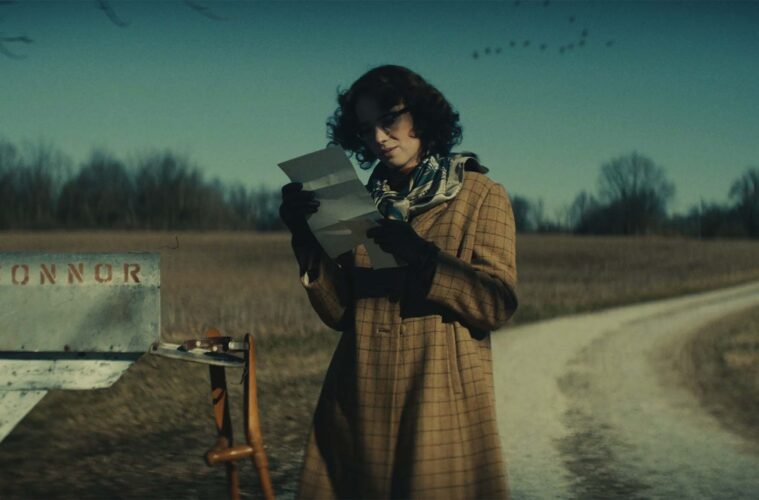
As you might guess, Ethan Hawke’s new passion project, Wildcat, is an ambitious paean to creative will, and a won’t-let-go love song to the old-fashioned act of making art. It’s Hawke’s brand by now, and I think we should appreciate what he’s become more than we do: a ubiquitous New York analog-culture gadfly and action-talker testifying at every opportunity to the relevance of handmade artisanship, if not in all the films he acts in (he’s not averse to paychecks), then in the films he’s written and directed, in the commitment to the indie auteurs he couples with (Linklater, Schrader, Almereyda, Ferrara, buddies like Frank Whaley and Vincent D’Onofrio), in the documentaries he’s appeared in, the interviews he garrulously dives into, the magazine stories he publishes, and the manic and deeply read filmhead opinions he spews at the drop of a hat. Name another name actor today as fumingly enamored of the collaborative creative process, and of the long legs of cinema history.
In Wildcat, the object of Hawke’s empathic adulation is none other than Flannery O’Connor (1925-1964), ever-revered queen of cold-blooded Southern Gothic fiction and one of the American grain’s preeminent and most merciless portraitists. Movies about writers are tough to make, and often the impulse should be resisted, but I think Hawke has done O’Connor proud, and his ardor for her thorny achievement, under her life’s withering circumstances, is the brew percolating out of this film’s ramshackle pot.
Of course, our foreknowledge and fore-awe of O’Connor’s fiction helps justify what is, ultimately, an homage. The more you heart her work, the more resonant Hawke’s often larky venture feels, while ignorance of the Flanneriad might prove fatal. O’Connor’s real-life story arc is simple and sad: After escaping from the provincial idiocy of her childhood Georgia and entering the mid-century American literati at the Iowa Writers’ Workshop, Yaddo, and in New York, she succumbed to lupus, as her father had years before, and had to return to her mother’s close-minded care and her family home, to live out her remaining years (12 of them, dying at 39) stuck in a social quagmire of Southern dimwittedness that had no clue as to what she was doing artistically, or why.
One of many dissertations on O’Connor, from 1980, is aptly titled “With Ground Teeth.” Perhaps, as scholars have suggested, this purgatorial trap pressurized and informed her writing, but there’s no doubt that emotionally it was a reversal of fortune, and a worst-case-scenario for this prototypical rebel-artiste, who dreamed of nothing as a girl but getting out, being a writer amid writers, and being understood.
Hawke and his star, daughter Maya Hawke (complete with horn rims and Flannery’s chipped incisor), have a tight grip on O’Connor’s defiance and helplessness, even if the film they’ve built often stretches and rambles in other directions. Chiefly, the beats of O’Connor’s biography are interpolated with reenactments of her stories, sometimes as she conceives of them (including “The Life You Save May Be Your Own,” “Revelation,” and “Parker’s Back”), with cast members (primarily Laura Linney, as O’Connor’s mother) playing similar roles in the mini-movies. It’s a risky gambit; fiction writers are, after all, more than the sum of their acquaintances, if they’re any good. These fragmented scenarios sometimes hint at the electric current of O’Connor’s internal process, as her daily observations are harvested for ideas. But they aren’t very convincing on their own, with the recycling of the actors serving to suggest that Hawke thinks O’Connor couldn’t imagine a character not derived in some way from herself or someone she knew.
In any case, maybe Hawke wouldn’t be the top choice to pull off a straight Flannery adaptation — he’s too ready with emphasis, too orthodox in his visual choices, and too indulgent with his actors. These are hardly unusual struggles in contemporary biopics, but as the narration is 100% O’Connor prose, we run into the Audiobook Problem, where the temperature in which we privately read distinctive prose is jacked through the ceiling by actors looking for juice. We could’ve used an icier realist approach. Maya, with her large suspicious eyes and crooked smile, is bewitching and has a cagey grasp of Flannery’s stresses, but the rest of the cast, in and out of the fictional bits, and especially Linney, gin up the Southern theatricality as though they’re in a roadshow performance of Cat on a Hot Tin Roof. You can hardly help contrasting the effect against O’Connor on the page, which hums with a downcast sense of quiet catastrophe. I’d point toward John Huston’s 1979 filmization of Wise Blood to get closer to the bone of what O’Connor is like on paper.
Other choices can be puzzling, including the characterization of Robert Lowell (Philip Ettinger) as a manic, floppy undergrad-ling. (By the late ’40s, he was a granite poet-stud, though also occasionally manic.) But Hawke’s utterly sincere fervor for the fiction and for O’Connor’s autonomous mission is never in question; you can disagree with tone or taste, but you can never say he sold the old girl short. Lit geeks should salute, and book clubs can hold group screenings to season their Flannery deep dives.
As it is, the film keeps bringing you back around to O’Connor’s life-arc crucible, to the point that the film formally resembles Pablo Larrain’s Jackie (2016) and Spencer (2021), all of them bell-jar dramas of sequestered and historically sidelined women in which the narratives run in tight, claustrophobic circles and the heroine’s dead-end plight draws its own pungent diagram about modern women and their enforced cultural marginality. Flannery’s heroic obduracy is there in the end, flaring out of Maya Hawke’s furious side-eye.
Advertising disclosure: We may receive compensation for some of the links in our stories. Thank you for supporting LA Weekly and our advertisers.

